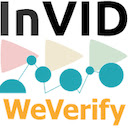Inside AFP
An update on digital investigation at AFP
On the eve of World Fact-checking Day on April 2, 2022, organised by the Poynter Institute, we take a look at AFP's activities in the fight against disinformation.
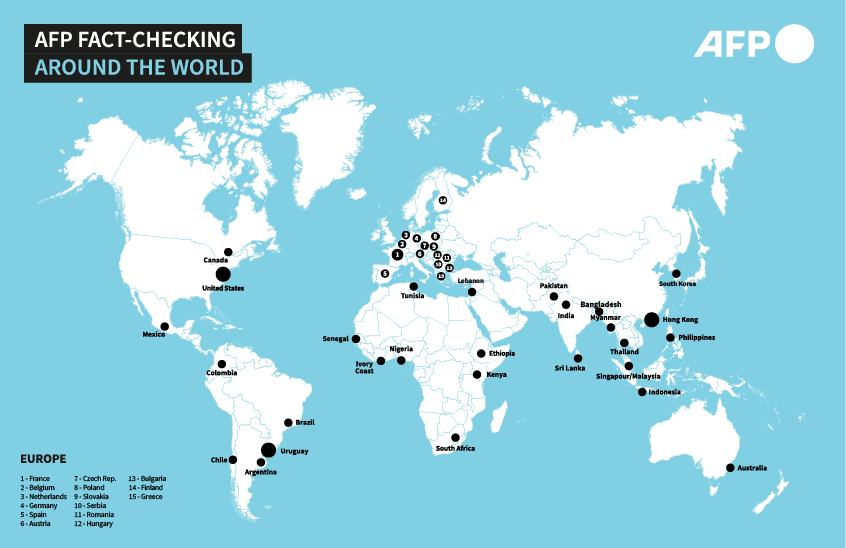
Since its launch in 2017, AFP's digital investigation unit has grown to become the world's largest network of journalists with expertise in this area. To date, AFP has more than 130 digital investigative journalists in some 30 bureaus, covering more than 80 countries in 24 languages.
The AFP Fact Check website and its 24 language versions

Created in 2017, the AFP Fact Check website verifies questionable, misleading or false information circulating online. AFP Fact Check’s journalists analyse viral text, photos and videos to detect false information. They pay particular attention to posts that spread hate speech, racist rhetoric and content that can potentially damage health and cause personal harm.
The journalists, who publish in 24 languages, focus on international or local issues.
On all five continents, AFP works in English, French, Spanish, Portuguese, Arabic, Polish, Catalan, Bahasa Indonesia, Bahasa Malaysia, Thai, Slovak, Czech, Polish, Romanian, Dutch, Burmese, BCMS (Bosnian, Croatian, Montenegrin, Serbian), German, Finnish, Greek and Hungarian.
To understand the work of the Fact Check team.
The InVID and WeVerify projects
In 2017, AFP's Medialab released a browser extension (usable on Chrome and Opera) as part of the European InVID project (2016-2018) that allows journalists, fact-checkers, human rights activists, educators and anyone else to check fake images and videos circulating on the internet and especially on social networks.
It is a toolkit with several services to verify still and moving images. This plugin is used by the main editorial offices that do fact-checking in the world. The extension currently has over 67,000 active users per week in 222 countries.
Two methods of verification are used: an endogenous method which involves a closer look at the image or digital file using a magnifying glass, metadata reader or forensic filters, and an exogenous method which involves retrieving contextual information from the web and doing image similarity searches to check whether the images have been previously published and indexed by one of the major image search engines. The plugin uses Google images, Bing, Yandex, Tineye, Baidu and Karma Decay.
Once the InVID project was completed at the end of 2018 after three years, the Medialab and its European partners were again selected by the European Union for a new project: WeVerify.
WeVerify (2018-2021) doubled the number of tools available on the verification extension, now called InVID-WeVerify, notably in the field of social network analysis but also in optical character recognition in images or via an assistant to guide users.
A third project, EnVisu4, funded by the Fact-Checking Innovation Initiative (Facebook and IFCN) in 2021, has improved the usability of forensic tools for detecting manipulation of images and created a new CheckGIF tool to create an animated image in GIF format to visually reveal all of the manipulations undergone by a tampered image.
The Objectif Desinfox operation
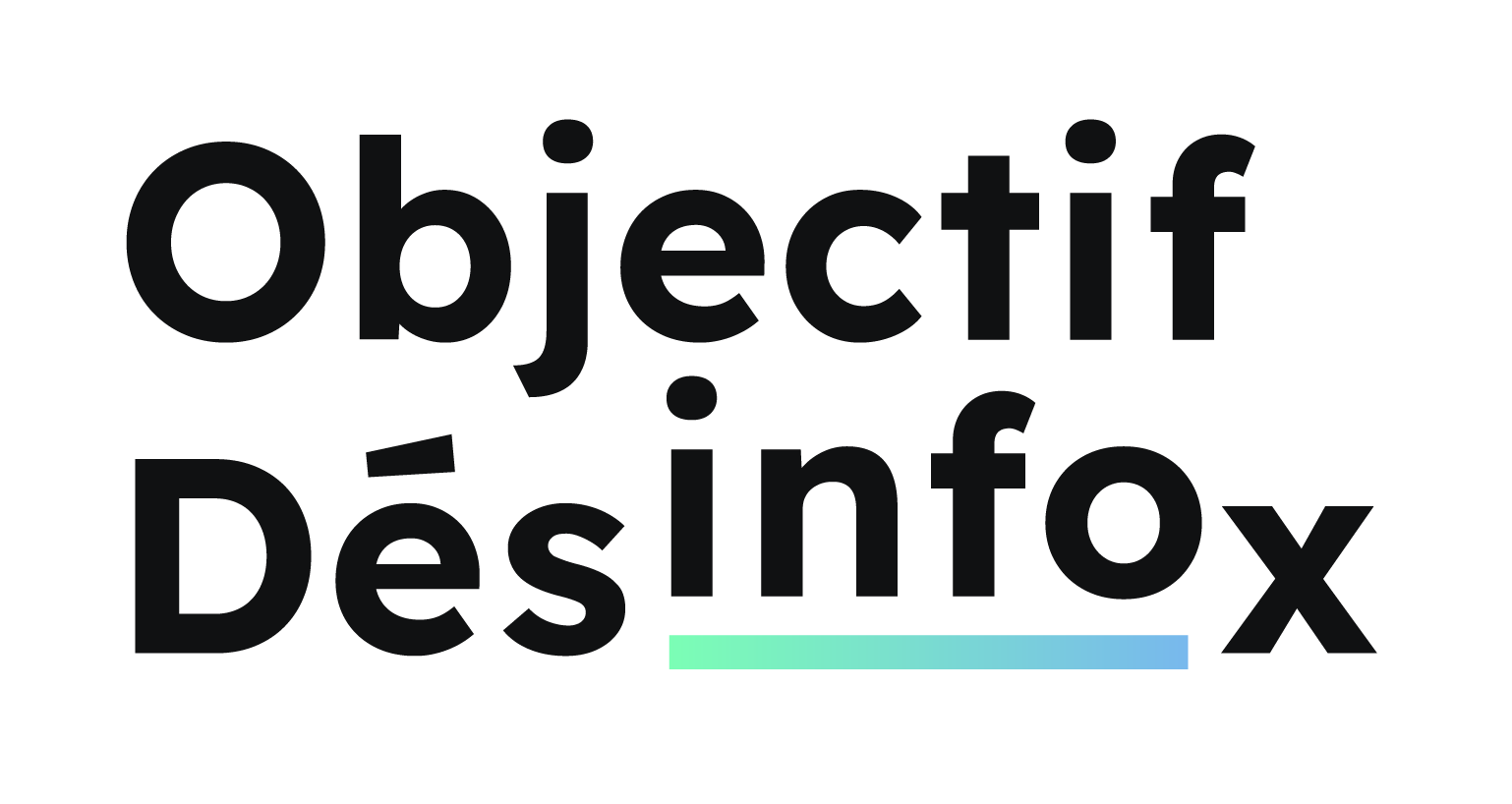
AFP is working with a coalition of 23 French media outlets to provide access to online training modules, support for coalition members and free sharing of all verification articles written for the French 2022 elections.
Read more about Objectif Désinfox.
AFP FACTCHECK
The Agency offers its investigative content in 24 languages to media wishing to provide their audiences with a response to growing disinformation. The multimedia articles, in the form of illustrated investigations (photos, videos and sources), are ready to be published automatically on the clients' digital pages.
In each of its fact-checks, AFP explains its research and investigation methods, with a number of illustrations, as well as how the tools it uses work. In this way, it enables everyone to carry out the same checks and come to the same conclusions about the existence of false information.
Partnerships with the European Digital Media Observatory (EDMO)

|

|

|
For France, the DE FACTO platform, launched in January 2022, is supported by Sciences Po, AFP, CLEMI - Centre for Media and Information Education, and XWiki SAS.Following a call for tenders, the European Commission selected AFP in May 2021 to participate in three unprecedented European programmes to combat disinformation, in France, Eastern Europe and the Benelux countries.
For the first time, the public in all these countries have access to sites where they can discover real-time fact-checks on the main fake news stories of the week, have access to research carried out by leading academics on disinformation, and learn how to debunk fake news themselves thanks to tools and tutorials made available to them.
For Poland, Slovakia and the Czech Republic, the CEDMO platform was launched on 10 February 2022, and is coordinated by Charles University in Prague. Facts-checks are provided in Czech, English, Polish and Slovak by AFP and by the websites Demagog.cz, Demagog.sk, Infosecurity.sk and Konkret24. The project also includes academic research on disinformation channels, regulation and the impact of disinformation on media, communities and society from the Polish SWPS University, the Czech Technical University, the Slovak Kempelen Institute of Intelligent Technologies and the University of Saints Cyril and Methodius.
For Belgium and Luxembourg, the EDMO BELUX hub was launched on 15 February 2022.
The Lakmusz.hu website

On January 11, 2022, AFP launched a Hungarian-language site dedicated to the fight against disinformation in partnership with a local media - the news site 444.hu - and researchers from the Media Universalis Foundation, a Hungarian university foundation linked to the Loránd-Eötvös University (ELTE) in Budapest.
A code of conduct for European fact-checking
AFP is working with Correctiv (Germany), Demagog (Poland), Pagella Politica (Italy), EU DisinfoLab (Belgium) and Fundación Maldita.es (Spain) within the European Fact-checking Standards Project (EFCSP) to draw up a Code of Professional Ethics to help independent fact-checkers in their work, with the support of the European Commission.
The WhatsApp partnership
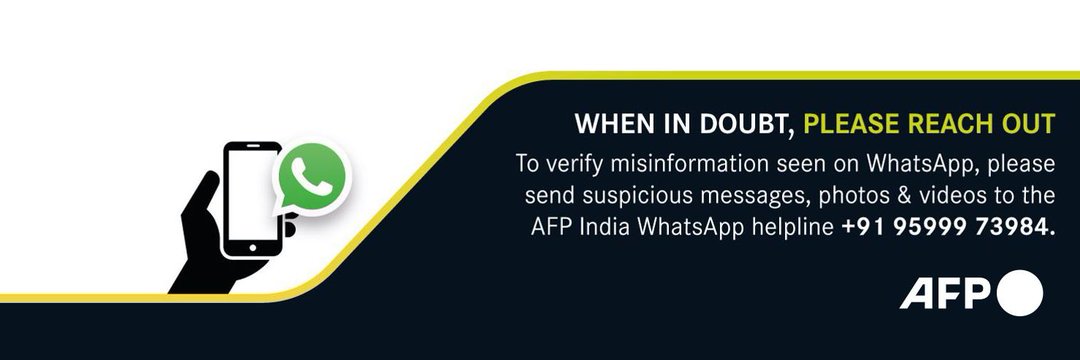
Since 2018, WhatsApp has partnered with various fact-checking organisations around the world including AFP.
Internet users can report on WhatsApp a dubious piece of information, a suspicious statement or an image that seems to be retouched.
For France, just click here.
These dedicated AFP WhatsApp lines are available in Brazil (+55 21 98217-2344), France (+33 6 47 08 70 46), Africa (English-speaking only +33 6 32 99 52 64), Germany (+49 172 2524054), India (+91 95 999 73984), Mexico (+52(1) 55 2503 9334) & LATAM (+52(1) 55 7908 2889) + Spain (+52(1) 55 7908 2889)
Media and information literacy
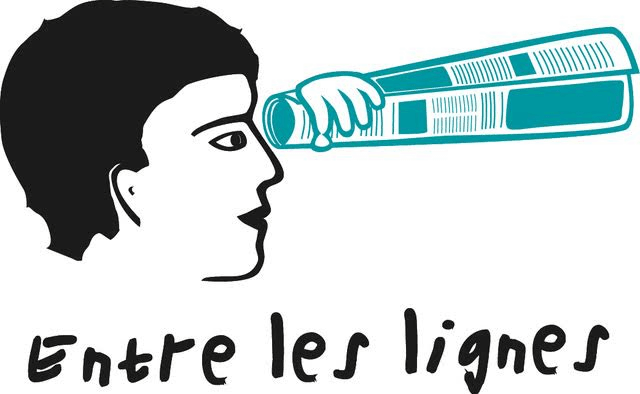
More than 200 journalists from the association Entre les lignes from the editorial offices of AFP, the Le Monde Group (Le Monde, Télérama, Courrier international, La Vie, Le HuffPost), L'Obs and Le Monde des Ados run workshops throughout the year, mainly in schools, to encourage critical thinking and to pass on tools and develop the right reflexes and attitudes in consumption of online information.
![]()
On the Éduthèque portal, AFP offers primary and secondary school teachers free access to multimedia archive files, and to a selection of animated graphics, computer graphics and videos, as well as to a space entitled "Behind the Scenes of the News" in which journalists explain their profession and the issues involved. The offer includes a search engine on each page and the possibility of sorting the content by school level, education or language (French, English, Spanish).
